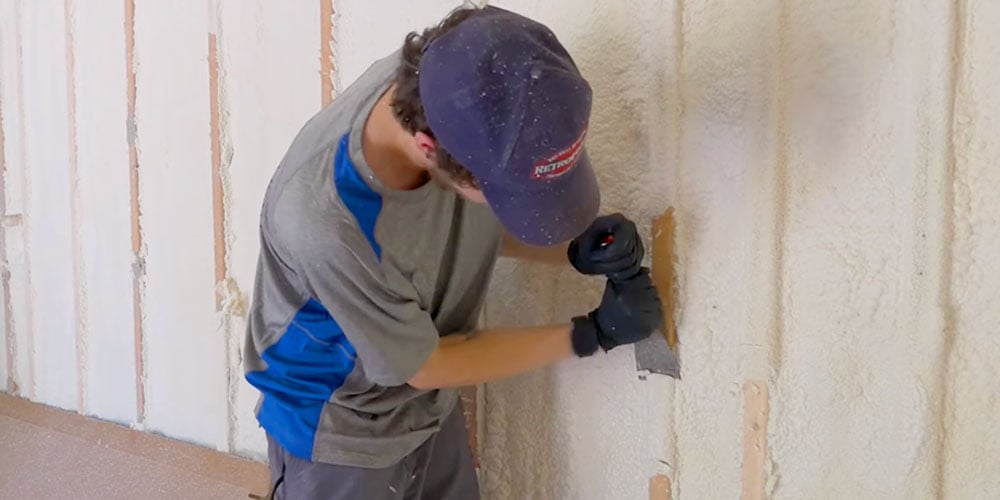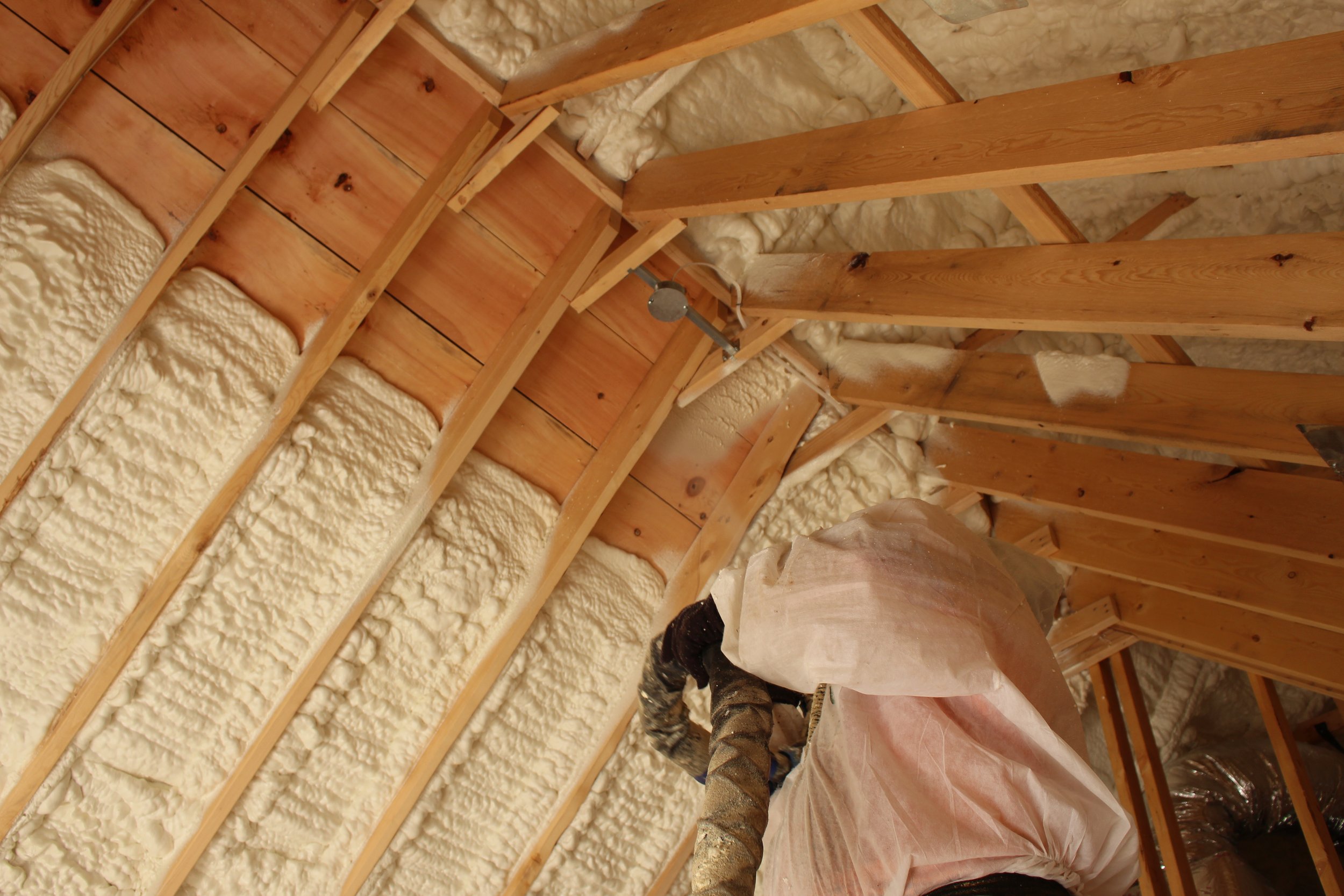How Spray Foam Can Enhance Energy Performance in Your Home
How Spray Foam Can Enhance Energy Performance in Your Home
Blog Article
Spray Foam: The Ultimate Solution for Air Sealing and Insulation
Spray foam insulation has emerged as a leading solution for effective air sealing and thermal insulation, offering a special combination of homes that establish it aside from standard techniques. Its ability to increase and fill up spaces makes it especially effective in preventing air leakage, which can significantly influence energy effectiveness. Recognizing the complete extent of its advantages, installation procedures, and comparisons with various other insulation kinds is critical for making educated decisions. As we check out these aspects, the effects for both new buildings and retrofits become significantly significant. What factors should affect your option?
What Is Spray Foam?
Spray foam is a flexible insulation material that combines the concepts of air securing and thermal resistance to improve energy effectiveness in structures. Composed primarily of polyurethane or other similar compounds, spray foam is used as a liquid that increases upon call with surface areas, developing a solid, constant layer of insulation. This distinct property allows it to fill voids, fractures, and voids that typical insulation products might ignore, providing an exceptional air seal.
There are two main sorts of spray foam: open-cell and closed-cell. Open-cell spray foam is lighter and a lot more adaptable, using exceptional audio absorption and a reduced R-value per inch - Spray Foam. In comparison, closed-cell spray foam is denser, supplying a higher R-value, wetness resistance, and included structural integrity to developing parts
The application process generally involves specific equipment, making certain a seamless application that follows numerous substrates, including metal, wood, and concrete. This flexibility makes spray foam suitable for both brand-new buildings and retrofitting existing frameworks. Its capability to produce an airtight obstacle considerably contributes to lowering energy intake and improving indoor air quality, thereby making it a recommended choice amongst building contractors and home owners alike.
Advantages of Spray Foam Insulation
One of one of the most substantial benefits of spray foam insulation is its exceptional capability to create a continuous air barrier, which properly reduces power loss. Unlike conventional insulation materials, spray foam increases to fill up cracks and voids, guaranteeing that air leak is dramatically minimized. This particular not only enhances energy effectiveness however additionally causes lower utility bills in time.
Furthermore, spray foam insulation gives premium thermal resistance, adding to an extra steady interior environment. Its high R-value per inch enables for effective insulation in restricted rooms, making it suitable for attic rooms, wall surfaces, and crawl rooms. In addition, the moisture-resistant buildings of spray foam assistance prevent mold and mildew and mold growth, advertising healthier living conditions.
One more critical benefit of spray foam insulation is its sound-dampening qualities (Spray Foam). It successfully lowers noise transmission between areas, producing a quieter and a lot more comfortable home setting. The resilience of spray foam also stands apart, as it does not sag or resolve gradually, preserving its performance throughout its life-span
How Spray Foam Works
Understanding how spray foam insulation works is crucial for valuing its effectiveness in air sealing and thermal resistance. Spray foam insulation includes 2 primary elements: isocyanate and polyol resin. When these components are mixed, they undergo a chemical reaction that causes the product to increase quickly, producing a thick foam that fills up tooth cavities, cracks, and gaps.
As the foam increases, it sticks to surfaces, creating an impermeable seal that substantially decreases air infiltration. This particular makes spray foam insulation extremely efficient at avoiding drafts and moisture infiltration, which can cause energy loss and damage over time. Additionally, the closed-cell variation of spray foam supplies exceptional thermal resistance because of its inflexible framework, efficiently lessening heat transfer.
The distinct residential or commercial properties of spray foam enable it to adapt to irregular surfaces, making certain detailed protection and a seamless barrier. Because of this, spray foam insulation not just enhances energy efficiency however additionally adds to boosted indoor air quality by reducing the build-up of irritants and contaminants. Inevitably, recognizing the auto mechanics behind spray foam highlights its function as a remarkable choice for insulation and air sealing in my explanation both household and commercial applications.
Setup Refine Introduction

Before installation, the area has to be properly cleaned up and prepped, making certain that surface areas are devoid of particles, dampness, and dirt. Since impurities can compromise adhesion and general performance, this step is crucial. When the area is prepared, the application entails blending both elements of the spray foam, which increases upon contact and fills spaces effectively.
Trained experts should conduct the setup, utilizing specialized devices to make sure uniform protection and optimal density. Safety precautions, including putting on safety equipment and making certain correct air flow, are crucial throughout this process. After application, the foam typically cures quickly, forming a solid obstacle that improves energy efficiency.
Contrasting Spray Foam to Typical Insulation
When reviewing insulation choices, spray foam insulation attracts attention in contrast to typical products such as fiberglass and cellulose. Among the main advantages of spray foam is its remarkable air sealing capacities. Unlike fiberglass and cellulose, which can enable air seepage, spray foam broadens upon application, loading spaces and crevices to develop a closed seal. This causes improved power efficiency, as much less warmed or cooled air gets away the home, leading to lower energy bills.
In addition, spray foam gives a higher R-value per inch than conventional insulation kinds, supplying more effective thermal resistance in a thinner account. This particular is specifically helpful in rooms with limited tooth cavity deepness. In addition, spray foam is immune to moisture and mold development, which can be a significant worry about cellulose and fiberglass, specifically in humid settings.
However, spray foam insulation usually lugs a greater in advance price than its traditional equivalents. Homeowners should consider this preliminary investment versus lasting power savings and efficiency advantages. Eventually, while both insulation read the article kinds offer their purpose, spray foam site web arises as a much more advanced remedy for modern insulation demands, especially in terms of air sealing and thermal performance.

Verdict
In recap, spray foam insulation stands for a very effective solution for attaining ideal air sealing and thermal resistance. Its one-of-a-kind properties, including dampness resistance and noise dampening, make it ideal for different applications in both brand-new constructions and retrofitting jobs (Spray Foam). Although the initial expenses might be higher compared to standard insulation products, the lasting benefits, such as significant energy financial savings and improved indoor air quality, justify the investment and underscore its value in modern building practices.
Spray foam insulation has emerged as a leading option for reliable air sealing and thermal insulation, supplying a special combination of buildings that set it apart from conventional approaches.Spray foam is a flexible insulation material that combines the concepts of air sealing and thermal resistance to enhance power effectiveness in buildings.When reviewing insulation choices, spray foam insulation stands out in comparison to traditional products such as fiberglass and cellulose. Ultimately, while both insulation kinds offer their purpose, spray foam arises as a much more advanced option for contemporary insulation demands, especially in terms of air sealing and thermal efficiency.
In recap, spray foam insulation represents a very effective remedy for accomplishing optimum air sealing and thermal resistance.
Report this page